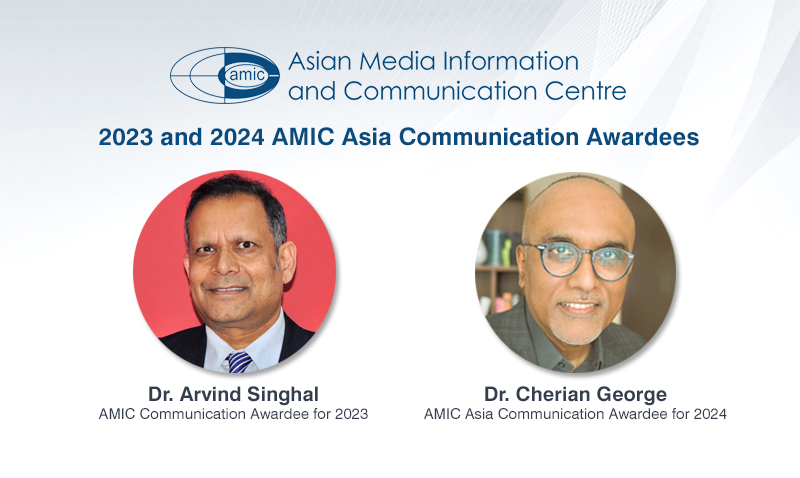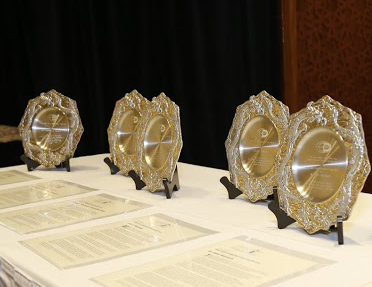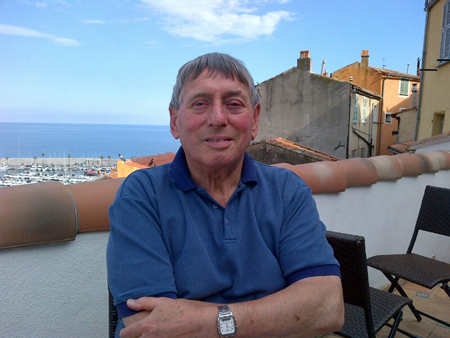
Sep 18, 2024 | AMIC Communication Awards
AMIC announces 2023 and 2024 AMIC Asia Communication Awardees
Asian Media Information and Communication Centre (AMIC) announces the selection of two Asian communication icons as recipients of the 2023 and 2024 AMIC Asia Communication Award.
The Award honors outstanding Asians who have made significant contributions to the Asian and global communication setting, said Dr. Crispin C. Maslog, chairperson of the AMIC Board of Directors.
The awardees are Dr. Arvind Singhal, professor at the University of Texas at El Paso, and Dr. Cherian George of the Hong Kong Baptist University.
The conferment will be held at the opening of the 30th AMIC Annual Conference to be hosted by the Communication University of China in Beijing, September 24 – 26 .
Dr. Arvind Singhal, AMIC Communication Awardee for 2023, is recognized for his important contribution to communication education, research, publications, and extension work. “The communication paradigms and strategies now etched in our toolbox have been enriched by Dr. Singhal’s four decades’ worth of contributions,” says the AMIC Award citation.
Dr. Singhal is known internationally for his research on the diffusion of innovations, entertainment-education strategy, positive deviance approach to social change, development communication, and liberating interactional structures.
He has led 34 funded research projects on these areas in many countries in Asia and other continents. He is currently the Samuel and Edna Marston Endowed Professor of Communication at The University of Texas at El Paso.
Dr. Cherian George, AMIC Asia Communication Awardee for 2024, is recognized for his work in journalism, academia, communication and media research, and socio-political advocacy, which he has accomplished “with excellence, integrity, and a deep understanding of the Asian contexts.”
Before transitioning to academia, Dr. George had a distinguished career in journalism in Singapore where he set high standards for investigative reporting and insightful commentary. This has accorded him a solid foundation in pursuing journalism education, communication, and media studies. He is currently a journalism professor at Hong Kong Baptist University.
AMIC established the AMIC Asia Communication Award in 2006 and has since conferred the award to 23 communication scholars, educators, and practitioners.
Jul 24, 2018 | AMIC Communication Awards, Annual Conference, Member Updates, News
The 2018 AMIC Award for ‘Transformative Leadership” has been accorded to Fr. Franz-Josef Eilers, svd at the 26th Annual Conference of the “Asian Media, Information and Communication Centre (AMIC)” on June 8, 2018 at Manipal ‘Academy of Higher Education’ in Karnataka, India “for his outstanding contributions in the field of Church and social communication”. He has “written extensively on human and social communication and developed the concepts of pastoral and evangelizing Communication” which is also reflected in an academic program at the Pontifical University of Santo Tomas in Manila. His several books in the field are considered as standard in the field, including a 632 page commented edition of all official Vatican documents on Communication from 1936 to 2014 (Logos, Manila).
AMIC is since the 1970s the only professional continental organization for Asian communication scholars and professionals which since 2006 gives only one annual Award to outstanding figures in the field. The last former awardees were Shelton Dhavalasri Guanaratne (2016) who is recognized as proposing a “de-Westernizing” communication theory especially under Buddhist but also Hinduism and Confucianism perspective. The 2017 Awardee Wijayanada Jayaweera was leading the “International Program for the Development of Communication (IPDC) at UNESCO in Paris and developed a “human-centric theory of Press freedom” based on Daoist principles.
Original article at St. Joseph Freinademetz Communication Center, Inc. website.
Sep 27, 2016 | AMIC Communication Awards
AMIC has reset the deadline for submission of nominees to its 2016 Asian Communication Award to 31 October 2016.
According to AMIC Secretary General Ramon R. Tuazon, the rescheduling will ensure that more nominees can vie for this prestigious award. The 2016 winners will be announced early next year.
Since 2006, 16 individuals have been recognized by AMIC for their outstanding achievements in various media and communication fields and categories.
The AMIC Asia Communication Award 2016 will be given in the following categories:
Research—pioneering contributions to the body of knowledge on media and communication research, such as the launching and completion of major research projects or the development of enduring theoretical approaches in the discipline;
Education—legacy in nurturing successive generations of media, communication, or journalism students and scholars;
Institution building—establishment of key communication and media programs, research centres or academic publications;
Excellence in journalism—sustained involvement in public service and observance of the highest journalistic principles; and
Outstanding practitioners from a single country within Asia-Pacific, a region within Asia, or the whole of Asia-Pacific can be nominated.
While the nominee need not be from Asia-Pacific, preference is accorded to regional actors.
Past awardees include eminent communicators and journalists Dr. John Lent, 2006; Prof. Eddie C. Y. Kuo, 2007; Dr. Nora Quebral and Dr. Florangel Rosario- Braid, 2008; Dr. Binod Agrawal and Dr. K. E. Eapen, 2009; Dr. Hidetoshi Kato, 2010; Dr. Georgette Wang and Dr. Crispin Maslog, 2011; Tan Sri Dato’ L. Krishnan, 2012; Dr. Alwi Dahlan and Mr. Jakob Oetama, 2013; Mr. Juan L. Mercado, 2014; and Dr. Alan Hancock and Dr. David Robie, 2015.
The award will be presented during the 2017 AMIC international conference in Manila, Philippines.
Nomination can be made by accomplishing the official nomination form (available at www.amic.asia), and submitting it with a nomination letter to:
Ramon R. Tuazon
Secretary General
Asian Media Information and Communication Centre (AMIC)
E-mail: r.tuazon@amic.asia or rrtuazon722@yahoo.com

Jul 22, 2016 | AMIC Communication Awards
 The Asian Media Information and Communication Center (AMIC) recognizes outstanding achievements in communication research, education, institution building, and journalism through the AMIC Asia Communication Award.
The Asian Media Information and Communication Center (AMIC) recognizes outstanding achievements in communication research, education, institution building, and journalism through the AMIC Asia Communication Award.
Past awardees include eminent communicators and journalists:
Dr. John Lent, 2006
Prof. Eddie C. Y. Kuo, 2007
Dr. Nora Quebral and Dr. Florangel Rosario- Braid, 2008
Dr. Binod Agrawal and Dr. K. E. Eapen, 2009
Dr. Hidetoshi Kato, 2010
Dr. Georgette Wang and Dr. Crispin Maslog, 2011
Tan Sri Dato’ L. Krishnan, 2012
Dr. Alwi Dahlan and Mr. Jakob Oetama, 2013
Mr. Juan L. Mercado, 2014
Dr. Alan Hancock and Dr. David Robie, 2015
Nominations for the 2016AMIC Asia Communication Award are now being accepted from AMIC members. The closing date for nomination is on 30 September 2016. Please accomplish the nomination form, which can be downloaded from www.amic.asia. Send the form, together with a nomination letter, to:
Mr. Ramon R. Tuazon
Secretary-General
Asian Media Information and Communication Centre (AMIC)
E-mail: r.tuazon@amic.asia or rrtuazon722@yahoo.com

Sep 8, 2015 | AMIC Communication Awards
 Dr. Alan Hancock and Dr. David Robie, two prominent communication professionals, received the 2015 AMIC Communication Award during the 24th International AMIC Conference held in Dubai on June 10-13, 2014.
Dr. Alan Hancock and Dr. David Robie, two prominent communication professionals, received the 2015 AMIC Communication Award during the 24th International AMIC Conference held in Dubai on June 10-13, 2014.
The 2015 AMIC Communication Award was also received by three longtime AMIC institutional collaborators: the Government of the Republic of Singapore, Friedrich Ebert Stiftung and Nanyang Technological University.
Dr. Alan Hancock of the United Kingdom received the award for“his meritorious lifetime contribution to communication education and research,institutional development and media advancement in Asia and internationally”.
From the 1960s, he was involved in many strategic interventions that impacted on educational media, and communication for social change and development in Asia.
From 1969-72, he was based in Kuala Lumpur, Malaysia where he initiated and coordinated UNESCO’s communication and media activities in the geographical region in the Pacific that stretch from Turkey to Japan.
He helped plan the establishment of the Asia-Pacific Institute for Broadcasting Development (AIBD), a regional training organization for media practitioners.
Dr. Hancock actively supported the establishment of the Asian Media Information and Communication Centre (AMIC) as a regional institution in 1971.
He helped plan and develop major national educational television and radio projects in Singapore, Malaysia and Thailand. He worked closely with universities in Malaysia, India and other countries to establish programs in communication research and education.
As Director of UNESCO’s key Communication Division in its Paris headquarters, Dr. Hancock initiated and provided technical expertise and funding support to establish many media and communication projects worldwide, especially in Asia and the Pacific.
While he had worked as television and radio producer at the British Broadcasting Corporation, Dr. Hancock earned eminent academic and publishing credentials at the East-West Communication Institute in Hawaii. He wrote and published extensively, initiating the first UNESCO World Communication Report.
He earned his doctorate from the Open University in the United Kingdom. Both his BA and MA qualifications are from Oxford University.
Meanwhile, New Zealand-based Prof. David Robie is the current Director of the Pacific Media Centre at the Auckland University of Technology where he made outstanding contributions in all award categories: Research, Education, Institution-Building and Excellence in Journalism.
He also has a journalistic background of over 40 years, with two decades focusing on such critical issues as human rights and environmental issues.
Professor David Robie is an A-ranked researcher, the highest rank for a university-based researcher in New Zealand.
In 2014, he received the Dean’s Award for Research Excellence for “Critic and Conscience of Society,” for the Pacific Media Centre’s Pacific Media Watch freedom regional project.
This year also sees a new edition of Professor Robie’s 1986 book, Eyes of Fire.
This republication marks the 30th anniversary of the bombing by French secret agents of Greenpeace’s MV Rainbow Warrior on July 10, 1985.
Professor Robie also wrote the book Don’t spoil my beautiful face, a tribute to human rights in the Asia-Pacific. It captured the struggles of the oppressed, and the pivotal role that journalism plays to bring about positive change.
As journalism educator, Professor Robie is helping develop critical, reflective and ethically-inclined journalism scholars.
In 2014, the Journalism Education Association of New Zealand (JEANZ) cited him for the “significant role (he has) played in fostering journalism and journalism education and research in the Asia Pacific Region.”
He was awarded the Faculty of Design and Creative Technologies Award for Critic and Conscience of Society (2014); Dean’s Award for Research Excellence (2012); Vice Chancellor’s Award for Excellence in Teaching (2011); and Creative Stimulus Award for innovation in covering “hot topics” in the Pacific Journalism Review research journal (2010).
In 2005, he received from the Pacific Islands Media Association (PIMA) the Pacific Media Freedom Award for an “outstanding contribution to the growth and development of journalists in the Pacific and New Zealand” (2005).
Sep 8, 2015 | AMIC Communication Awards
The Asian Media Information and Communication Centre (AMIC) has given its special AMIC Asia Communication Award 2015 to three long-time partners that have consistently supported the organization since its birth in 1971.
Awarded were the Government of the Republic of Singapore, the Friedrich Ebert Stiftung (FES), and the Nanyang Technological University (NTU).
The AMIC Asia Communication Award is a yearly award given to outstanding personalities in Asian media and communication. Awardees are chosen based on a decision of a jury of AMIC Board members.
By contributing to AMIC’s growth as an organization,the three institutions have promoted the cause of Asian media and communication.
The award was given on June 10, 2015 during the gala dinner for the 24th AMIC International Conference hosted by the American University in Dubai, United Arab Emirates.
Founded in 1971, AMIC established its first headquarters office in Singapore, with support from various partners, including the Government of Singapore, FES and NTU. AMIC remained in Singapore until 2014.
The Singaporean government provided AMIC with its first research, administration, and library facility at #39 Newton Road. It also subsequently sustained its logistical and financial support to enable AMIC develop its activities and programs.
Meanwhile, since 1971, FES actively fundedAMIC’s activities, including conferences, research, publishing, education, and project implementation.
FES funded AMIC’s journals, monographs, and conference programs for 40 more years. It also provided full-time senior research staff, visiting scholars, and specialists to help AMIC develop its regional membership base.
It has consistently provided AMIC with vital intellectual and infrastructural capacity over an extended period, and remains committed to AMIC as an international collaborator.
FES is a non-profit German political foundation that advances the basic values of social democracy through education, research, and international cooperation.
FES was founded in 1925. It is named after Friedrich Ebert, Germany’s first democratically elected president.
For nearly 20 years, the NTUhas hosted the AMIC’s regional headquarters within its Wee Kim Wee School of Communication and Information (WKWSCI). The University made available extensive office, library, and seminar facilities for AMIC’s operations.
With its generous annual grant, NTU enabled AMIC to recruit and retain staff members from Singapore and the international community. It expanded with in the Asia-Pacific region and beyond with its programs, projects, publications, and recruitment of members.
AMIC and NTU’s WKWSCI also jointly published peer-reviewed journals and monographs. As partners, AMIC opened its extensive Asian Media Resource Library to the WKWSCI.
With assistance from the Singaporean government, FES, NTU and other collaborators, AMIC evolved as an international, not-for-profit, nongovernmental organization that is now a regional research hub for media and communication studies.
AMIC encourages ethical practices and social responsibility in media and communication. It promotes democratic access and participation in media development and production by empowering disadvantaged sectors in Asia’s developing countries.




 The Asian Media Information and Communication Center (AMIC) recognizes outstanding achievements in communication research, education, institution building, and journalism through the AMIC Asia Communication Award.
The Asian Media Information and Communication Center (AMIC) recognizes outstanding achievements in communication research, education, institution building, and journalism through the AMIC Asia Communication Award.
 Dr. Alan Hancock and Dr. David Robie, two prominent communication professionals, received the 2015 AMIC Communication Award during the 24th International AMIC Conference held in Dubai on June 10-13, 2014.
Dr. Alan Hancock and Dr. David Robie, two prominent communication professionals, received the 2015 AMIC Communication Award during the 24th International AMIC Conference held in Dubai on June 10-13, 2014.